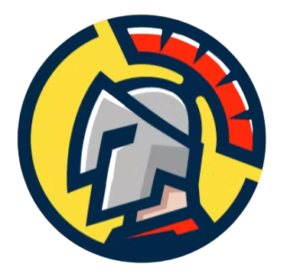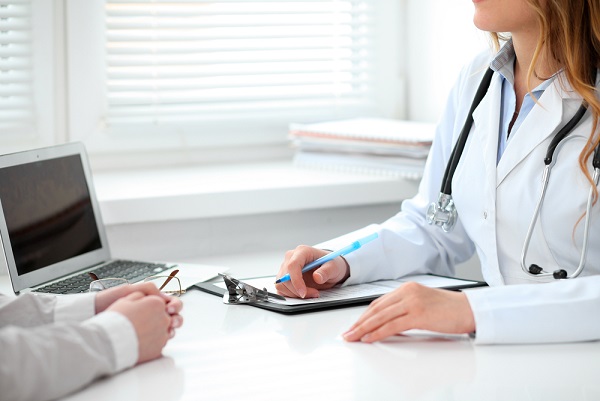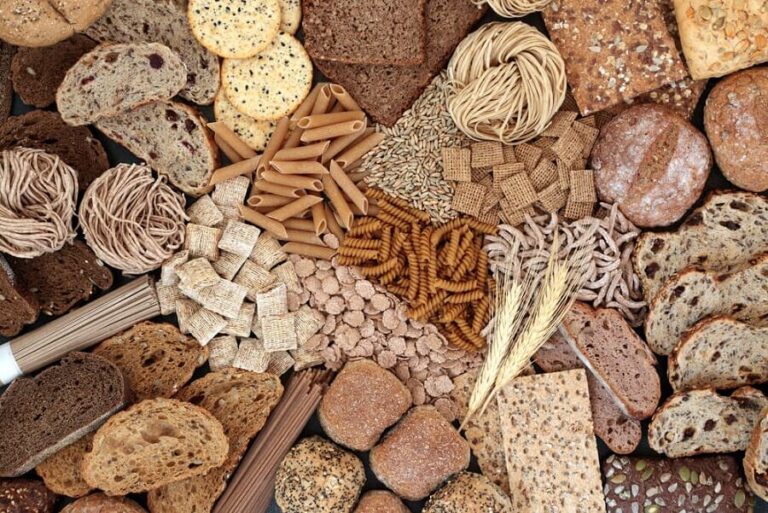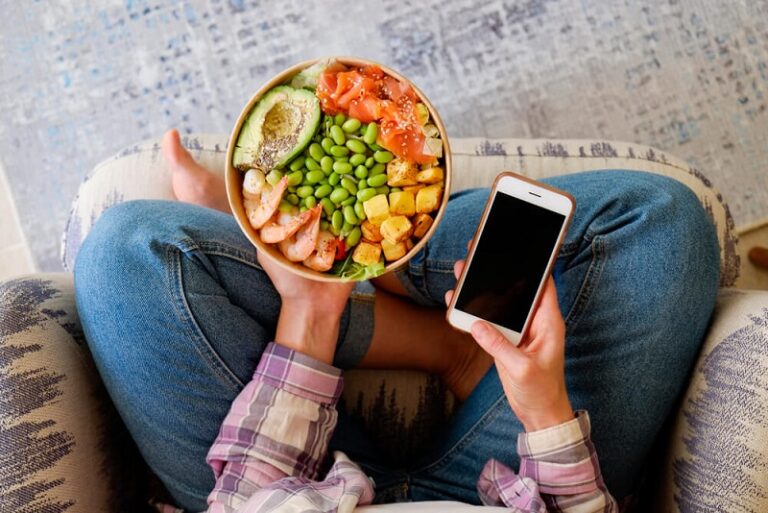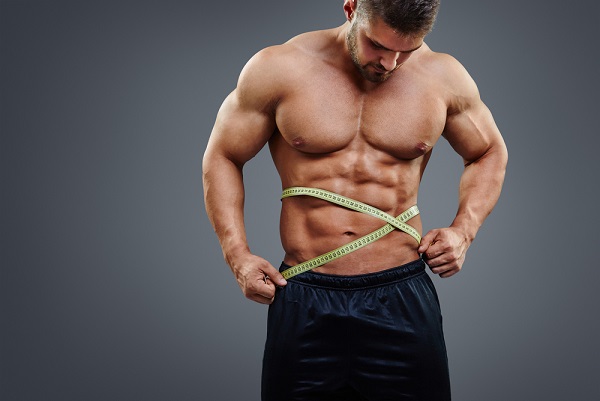when blood pressure is too low?
When blood flows through your blood vessels at a pressure that is lower than usual, you have low blood pressure. Hypotension is the medical word for low blood pressure. (1)
In general, hypotension is defined as a measurement of less than 90 mm Hg for the top number or 60 mm Hg for the bottom number. Someone else may be fine with what another person considers to be normal blood pressure.
Two numbers represent the reading of the blood pressure. Systolic pressure, or the pressure in the arteries as the heart beats and fills them with blood, is measured by the first and higher of the two parameters. The second number represents the diastolic pressure, which is the pressure in the arteries between heartbeats.
Systolic/diastolic blood pressure should be less than 120/80 for a healthy person.
what causes low blood pressure?
Hypotension can be brought on by a heart attack, heart failure, heart valve dysfunction, and an abnormally slow heartbeat. illnesses relating to hormones. Blood pressure can fall in conditions like Addison’s disease that damage the parathyroid or adrenal glands.
Other reasons could be:
- Pregnancy
- Heart arrhythmias (abnormal heart rhythms)
- Widening, or dilation, of the blood vessels
- Liver disease
- Diabetes
Dehydration, diarrhea, vomiting and excessive blood loss during menstruation are some of the common reasons of low blood pressure.
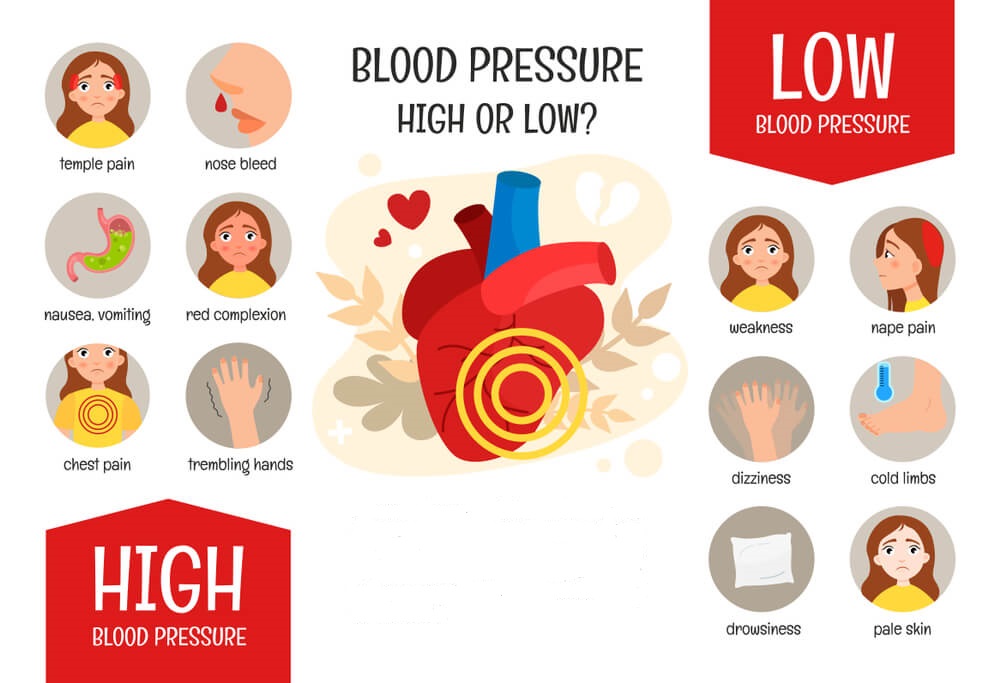
signs of low blood pressure
- Confusion
- Dizziness or lightheadedness
- Fainting
- Feeling tired or weak
- Blurry vision
- Headache
- Neck or back pain
- Nausea
The condition known as shock can result from extremely low blood pressure. Shock symptoms include: (2)
- Confusion, especially in older people
- Cold, clammy skin
- Decrease in skin coloration (pallor)
- Rapid, shallow breathing
- Weak and rapid pulse
what to do for low blood pressure
Getting comfortable and sitting down may help with the symptoms. Your body’s essential organs won’t receive enough oxygen and nourishment if your blood pressure falls too low. When this occurs, hypotension might cause shock, which necessitates prompt medical care. A blue skin tone, quick breathing, chilly and sweaty skin, or a weak and rapid pulse are all indications of shock.

treatment of low blood pressure
For hypotension, you might not require treatment. Treatment options could include increasing your fluid intake to avoid dehydration, taking medications to raise your blood pressure, or changing medications that lower blood pressure, depending on your symptoms.
Your doctor might discuss modifying your eating habits, sitting and standing habits, and other aspects of your lifestyle with you. If you stand for extended periods of time, your doctor could also advise compression stockings.
Severe hypotension caused by shock is a medical emergency. You may be given:
- IV access to blood and medications to raise blood pressure and strengthen the heart
- Antibiotics
After standing up too quickly, there are several treatments for hypotension:
- If medication is to blame, your doctor could adjust the dosage or switch you to a different medication. Before speaking with your practitioner, do not stop taking any medications.
- To manage dehydration, your doctor could advise you to drink extra liquids.
- Blood clots in the legs can be prevented by wearing compression stockings. More blood is kept in the upper body as a result.
low blood pressure in pregnancy
Unless you have symptoms, hypotension during pregnancy generally isn’t a problem. Large dips could indicate a significant or even life-threatening issue. Falls, organ deterioration, or shock can result from extremely hypotension.
Low Blood Pressure Diet
Foods To Focus:
1. Water
Your blood volume suffers greatly as a result of dehydration, and a drop in blood volume could result in a dip in blood pressure. Maintaining hydration is crucial, especially when exercising. Drink plenty of hydrating liquids like coconut water or water.
2. Vitamin B-12
Hypotension patients need to consume vitamin B-12 in their diets. Anemia can result from a lack of vitamin B-12 and reduced blood pressure. Eggs are a great source of vitamin B12. Incorporate eggs into your diet in whatever way you can, including boiled, scrambled.
3. Coffee
Blood pressure is known to briefly increase when taking caffeine. Drink a lot of coffee or tea if your blood pressure dropped rapidly and you started to feel lightheaded. By activating the cardiovascular system and raising your heart rate, it may aid in raising blood pressure.
4. Salty Snacks
Salt itself increases blood pressure, So it is helpful to have some salty snacks like potato chips or nachos to increase your blood pressure.
5. Low Carbohydrate Foods
Foods high in carbohydrates are digested by the body more quickly than other foods, which causes a dramatic reduction in blood pressure. Doctors advise cutting back on carbohydrates and replacing them with sources of proteins and lipids.
Omega-3 fats, which have been linked to good heart health, are abundant in salmon and other fatty fish. In actuality, salmon includes 61mg of sodium and 22g of proteins per 100g, both of which can help to regulate blood pressure.
Another excellent source of protein and vitamin B12 is chicken. Chicken breast has 31g of protein per 100g serving. Additionally, 75 grams of the same include 0.3 micrograms of vitamin B12.
Foods To Avoid:
1. Alcohol
Dehydration, which is a cause of hypotension circumstances, is brought on by alcohol use. As a result, it seriously harms hypotensive people. Additionally, since it’s imperative to maintain the body hydrated at all times, regular alcohol consumption must be avoided.
2. High Carb Diet
An excessive amount of carbs in large eating portions can further reduce blood pressure. This occurs as a result of your body working harder to digest the food, which causes your blood pressure to drop. Therefore, hypotension patients are advised to have a little piece of a carbohydrate-rich food at regular intervals.
3. Milk
Milk has a lot of water and nutrients, but it also has calcium, which slows down how quickly iron is absorbed in the gut. Anemia is the outcome, and anaemia can cause low blood pressure. Therefore, excessive consumption of milk and other calcium-rich foods must be avoided.
4. Vegan Diet
It is clear from the list of foods for hypotension patients above that a diet lacking in protein and vitamin B12 can make their condition worse. Therefore, low blood pressure can occur among vegetarians or vegans who do not consume chicken products, which are rich in these nutrients.
5. Low Sodium Foods
Foods with higher salt content are essential for hypotension patients. Therefore, if you are suffering from low BP, you must not consume low-sodium foods like frozen fish, unsalted nuts and seeds, dried peas and beans.
